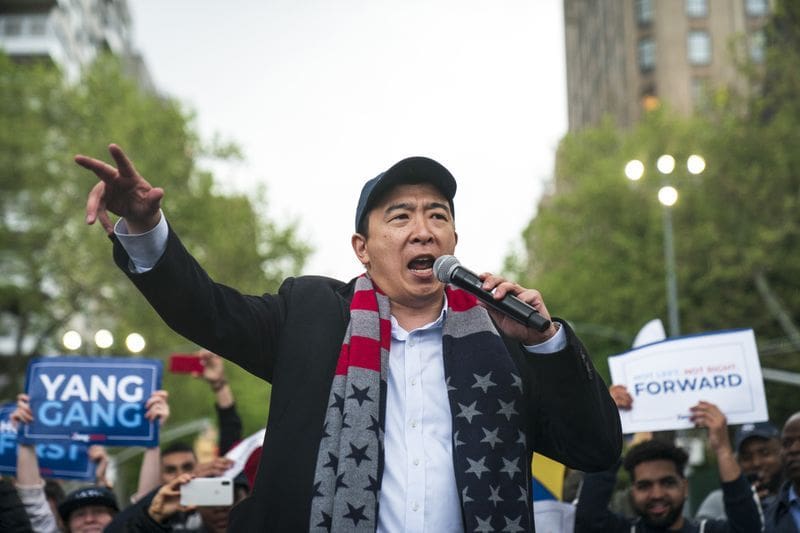Making the Case for Universal Basic Income: An Author Q&A
I recently interviewed Steven Shafarman about his new book, “Our Future: The Basic Income Plan for Peace, Justice, Liberty, Democracy, and Personal Dignity.”
Let’s get this disclaimer out of the way: Your “Our Future” was released by RealClearPublishing, our new book imprint, so I suppose I have a conflict of interest.
Not really. Under RealClear’s hybrid publishing model, almost all the royalties from book sales go to me, so you’re off the hook, Carl.
All right, then, let’s get started, Steve. The place to begin is probably this: What’s the standard working definition of Universal Basic Income?
The Basic Income Earth Network was founded in 1986, and I like their definition, which has five core features: Periodic, not irregular or one-time-only. Cash, not housing, food, or other in-kind support. Individuals, because households and families vary. Universal for adults, perhaps with a smaller amount for children. And unconditional, no means-testing or work requirements.
Most plans, including mine, are for citizens only. I often refer to UBI as Citizen Dividends.
Although you have personally championed UBI since Ronald Reagan was president, I’m not sure most Americans were familiar with it until Andrew Yang ran for president on this issue. When you saw his candidacy gaining traction among young people at the outset of the 2020 Democratic primary season, did you think, “My ship has come in”?
My first thought was “The checks will be in the mail sooner than I expected. Thanks, Andrew!” His campaign was great for our movement, and I’m thrilled with his continuing efforts through Humanity Forward.
In my experience, as people learn more about it, particularly when they pause and think about the potential benefits for themselves and their families, nearly everyone agrees that UBI makes sense. Young people weren’t the only ones who supported Andrew Yang. Many older people say we should study it, at least, and some recall that a majority of Americans favored related ideas in the 1960s.
What originally attracted you to this idea?
I started as a concerned citizen, simply trying to understand why pollution, racism, crime, war, and other problems seemed unsolvable. In the mid-1980s, I was studying the way young children learn and move, and I began to play with the analogy of “the body politic.” Very young children outgrow crawling as they learn to walk, and their parents provide their basic needs for food, shelter, security, and more. So I started to wonder if we, as a society, can “outgrow” our problems. And I concluded that the key is to guarantee everyone’s basic economic security.
I’ve been passionate about these ideas ever since. That passion or drive, or maybe obsession, has now produced six books.
It’s an immense social experiment, but not completely untried. Isn’t Alaska’s oil fund dividend a form of UBI?
Yes. Alaska has a true, though small, basic income, since 1982, and proponents around the world cite it as an important example and a great success. There have been many experiments, including a series of programs that the U.S. government funded in the late 1960s and early ’70s under the Nixon administration. Every experiment has had positive results, significant gains for individuals, families, and society.
Various experiments are currently underway. One is in Stockton, California, where 130 residents have been getting $500 a month, no strings attached, since February 2019; that’s scheduled to continue through the end of this year. There’s a small program in Jackson, Mississippi, with black single mothers. A very large experiment is being launched with a few thousand people getting funds and thousands more as a control group. Those and several other programs are privately funded. City governments in Chicago, Newark, and elsewhere are actively considering programs. There have also been basic income experiments in Namibia, India, Kenya, and Brazil. Finland recently completed a two-year program.
In the book, I have a comprehensive history of related ideas in the United States, along with brief reviews of international activities.
Three years ago, the Roosevelt Institute and the Levy Institute put out a joint study asserting that UBI could spur the U.S. economy to grow substantially. I believe the assumptions they plugged into their economic model was $1,000 per month for all adults and $250 for minor children. They predicted a stunning rise in GDP within four or five years. Critics said this was nonsense: that UBI payments would explode the federal debt, causing a stifling effect on the economy while simultaneously diminishing people’s incentive to work. How would you answer that critique?
One of my goals is to prod critics to question their assumptions. Our economy’s central weakness, according to economists on the left and the right, is lack of demand. That’s been true for more than a decade, long before the coronavirus and the recent economic collapse. The Roosevelt Institute study showed that most people would promptly spend their UBI dollars, demanding goods and services. That’s how it will produce real economic growth, and that’s why it’s certain to provide much greater stimulus than tax cuts or other supply-side policies.
When people ask about work incentives, I usually respond by turning the question around and making it personal. Would you work less? Would you be happier if you had the choice to work less, with greater opportunities to devote more time to your kids, your hobbies, your church or community activities? Would you be harmed if other people work less?
Work will still be a source of pride, meaning, and dignity. And everyone will be more free to pursue meaningful work. Today, often, people are coerced by poverty into jobs that are demeaning, degrading, or unsatisfying, and with UBI people will have the freedom to say no. There will also be people, perhaps many, who use their basic incomes as a platform for starting their own businesses, and they might be working more and harder than today.
Okay, but – and you knew this was coming – how much will it cost?
Critics typically talk about the gross costs, and often cite a figure of $2 trillion or $3 trillion a year. Although that’s accurate for a UBI of $1,000 a month, the calculation is much too crude. Serious critics acknowledge that we’ll be cutting programs that are no longer necessary: welfare, corporate welfare, and such, cutting federal, state, and local spending. I discuss potential cuts in the book, with budget numbers, and I show how those cuts and related reforms will more than pay for the UBI. We might have a surplus, which can go toward reducing the federal debt.
You write in your new book that Universal Basic Income is about “more than money.” Can you amplify on that point?
Yes, happily. That’s my favorite question and a main point of the book. A root cause of our social, cultural, and political problems is lack of social trust, particularly lack of trust in government. That’s not a recent concern, and it’s not the fault of Donald Trump or Barack Obama or Hillary Clinton or anyone in particular. The whole system is dysfunctional.
With UBI, every American will have a monthly reminder that we are citizens, each and all of us, with a direct personal stake in making our government trustworthy, effective, and accountable. This, I believe, is vitally necessary. It’s one of the core themes throughout the book.
Still, that’s quite a subtitle: “The Basic Income Plan for Peace, Justice, Liberty, Democracy, and Personal Dignity.” It’s a miracle public policy! In your book, you promise it would do even more, including help end hunger, homelessness, extreme poverty — even global warming. Are you overselling UBI?
It’s not a miracle public policy, not at all, and in the book I’m very careful with my claims. It’s a catalyst to dissolve the dysfunction in our politics. It’s also a key to unlock our individual and collective efforts toward achieving the country we deserve.
In conventional discourse, peace, justice, liberty, democracy, and personal dignity are abstract ideals. I aim to make them concrete. Throughout the book, I invite readers to think actively about each of these concepts and about their personal dreams and goals. What would you like to see in the next five or 10 years? What do you want for your children and grandchildren?
Am I overselling it? Perhaps, though that’s partly intentional, to inspire hope and to encourage people to engage as active citizens.
Some Americans view UBI as a parody of a liberal giveaway. But you’ve told me previously that you believe independents and conservatives should embrace this idea.
It’s true that some UBI proponents are, or sound like, extreme liberals who would be happy to give everything to everyone. Yet these ideas also have strong conservative and libertarian roots. Prominent conservative economists, including Nobel laureates Milton Friedman and Friedrich Hayek, endorsed versions of basic income, and I have quotes from both in the book. When I talk with conservatives or libertarians, I like to emphasize that this may be the best, or only, way to succeed in cutting government. A specific example: Many conservatives favor a flat income tax. I have four tables in the book that combine a UBI with a flat tax, and I show that the net result will be fair, simple, and inclusive, and would likely be extremely popular.
One of the major challenges while writing the book was to constantly think about how to reach people from across the political spectrum, including those who normally avoid or denounce politics. Specifically, I was seeking to reach folks who might have voted for Donald Trump and those who might have voted for Bernie Sanders, without alienating either side. Now that the book is out, I’m sure people will tell me where I’ve succeeded and how I’ve failed or fallen short.
Well, it was first proposed in this country by Thomas Paine, so there’s that. But why doesn’t the nation’s social safety net, which includes TANF [Temporary Assistance to Needy Families], food stamps, Social Security, Medicaid, Section 8 housing, the Earned Income Tax Credit, constitute a de facto form of Universal Basic Income?
The social safety net is tattered, unravelling, and, in the opinion of most recipients and many analysts, clearly inadequate. Existing programs have big bureaucracies and burdensome requirements that vary from state to state. Countless people are left behind or fall through the cracks.
UBI will be a solid floor. No cracks, no holes, no loopholes. And because it’s universal and unconditional, it can be administered with minimal bureaucracy and minimal costs. These are some of the reasons it appeals to liberals and conservatives. Everyone will have real economic security while we cut and reform programs that become superfluous.
Final question: When Congress started appropriating trillions of borrowed dollars to deal with the pandemic while paying little attention to who got the money and how they used it, without a clue as to how to pay it back, the question arose in my mind. Did we just adopt the logic of Universal Basic Income without calling it by that name?
Most of that money, as you know, Carl, went to big corporations, including banks, airlines, hotel chains, and other employers, with the funds created and distributed through the Federal Reserve. A significant chunk was tax cuts for investors and real estate developers.
The $1,200 direct payments to most Americans partly reflected the logic of UBI, and many people used that term to describe it. But our government distributed funds directly to help end recessions in 2001 and 2008, both times under the George W. Bush administration. So the policy had previously proved successful, though the rhetoric changed significantly.
With the coronavirus and the economic collapse, we can readily see many reasons to promptly implement a true UBI. Suppose every adult citizen is getting $1,000 a month, or just $500, perhaps with an additional $250 or $300 for every child. Knowing that each of us and all of us will have that income next month, and the month after, and next year, we won’t be so worried about our jobs and our finances. And everyone will be better prepared to protect ourselves from a second wave of this virus or any future epidemic.
The sooner we act, the greater the gains for everyone and our society as a whole. Let’s compromise on the details and make it happen. Let’s make history!
Carl M. Cannon is the Washington bureau chief for RealClearPolitics. Reach him on Twitter @CarlCannon.





















